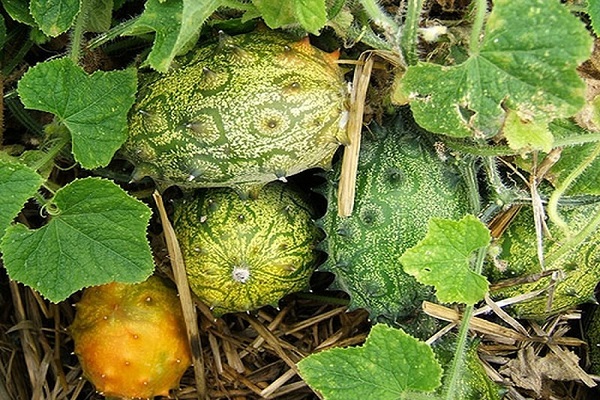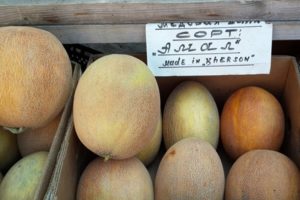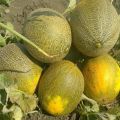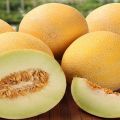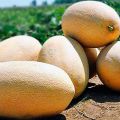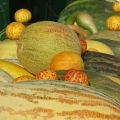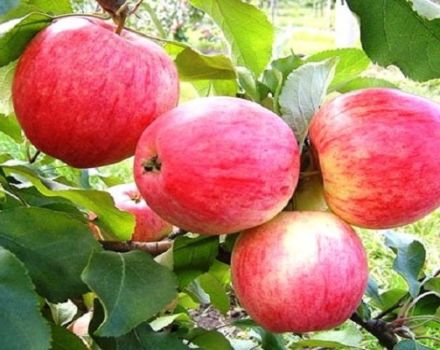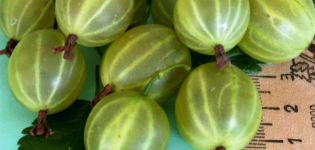Varieties of Horned Melon (Kiwano), its characteristics, description and cultivation
Today are interesting times for exotic lovers, when you can buy a lot of food, and, in particular, fruits. One of them is Horned Melon. It is an amazing fruit that grows in the hot climate of Africa. It attracts many gourmets with its yellow-orange peel and jelly-like pulp with a tart taste.
Kiwano traits
Melon Kiwano, Anguria, Melano, african cucumber - these are all the names of this plant. It is a herbaceous annual liana. She is a close relative of our cucumbers. The exotic culture blooms in yellow, has large, strongly dissected leaves. Plant height due to creeping climbing shoots can reach up to 4 meters. On the stems it has a large number of antennae, and the culture is also highly branching.
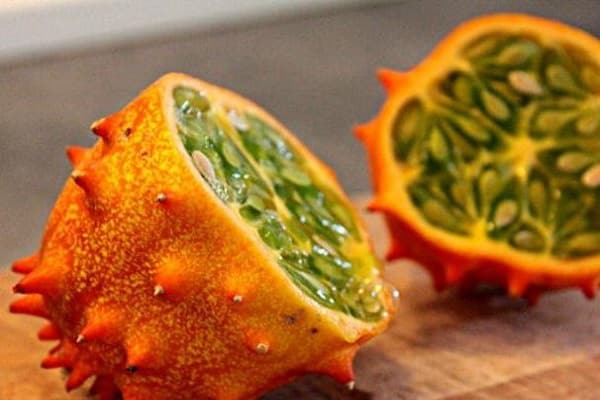
The fruits of African exoticism are elliptical in shape, with strange, large thorns placed on them. While they are not yet ripe, they have a light green peel, and later change their color to yellow-orange. Kiwano's pulp is dark green, jelly-like, with a lemon scent. The size of the fruit is identical to that of a pot-bellied cucumber (6–12 cm), and it weighs 40–350 grams.
The ripening period lasts up to about 70 days from germination. The time of the beginning of fruiting is mid-summer, up to 50 fruits can be set on the plant for the entire period.
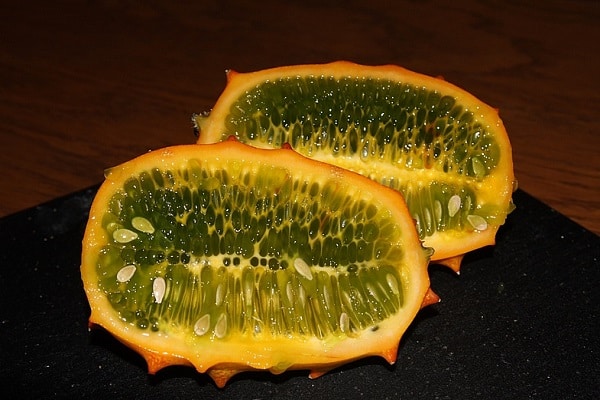
Chemical composition and useful properties
This fruit is composed of proteins, fats and carbohydrates. It contains many vitamins, especially of the B and P groups, as well as ascorbic acid and beta-carotene. With trace elements Kiwano contains potassium, iron, calcium, manganese, phosphorus and copper with zinc. In addition, there are organic acids and salts in the fruits of this plant.
The beneficial qualities of Horned Melon are:
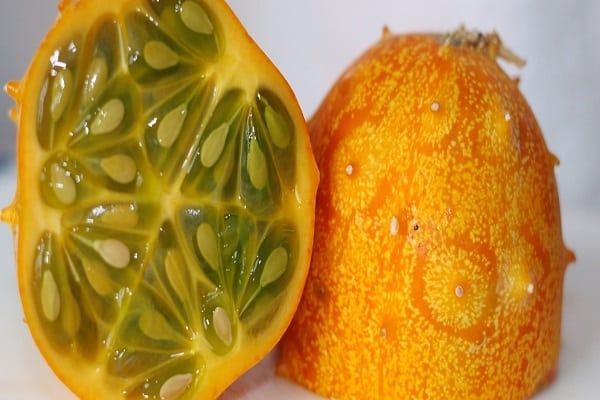
- It can be grown both as a vegetable plant and as an ornamental crop. The fruits look so beautiful on vines that you can create original compositions with their help. It is also possible to use the fruit to decorate the Christmas tree.
- It is a low calorie food with a lot of liquid. The fruits of this culture should be eaten when losing weight.
- The overseas fruit has a number of medicinal properties. It has a good effect on human health in cardiovascular diseases, anemia, atherosclerosis, tuberculosis, gout, bronchitis.
- Kiwano fruit juice is used as a sedative. It is very useful for people with sleep disorders to drink. To do this, take 15 drops of juice and add honey.
- The juice also removes toxins and radionuclides.
- Horned melon improves intestinal motility and, when applied externally to the skin, actively heals burns and open wounds.
- The sweet taste of the fruit will not prevent diabetic patients from using it.
- You can make original plates or cups from its peel, if you dry them after eating the pulp.
No harmful substances have been found in Kiwano, however, some people may have an allergic reaction to it.
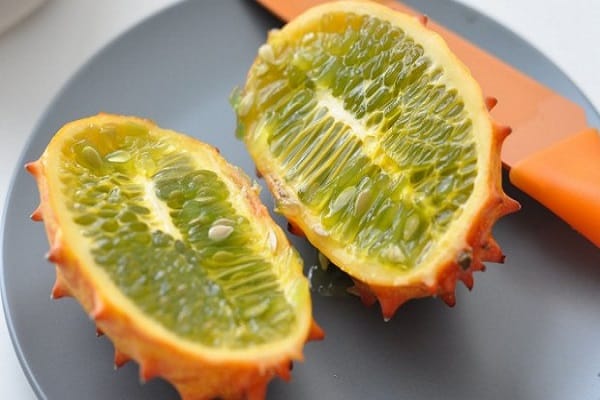
Ways to Eat Exotic Fruit
At a time when we only think about how it can be eaten, the peoples of Africa use it both as the main ingredient in dishes and as a snack.
Its taste is very interesting: it resembles a mixture of banana, lemon, zucchini, and even cucumber. By consistency, the pulp of an exotic fruit is jelly-like and aromatic. An excellent solution is to consume the fruit fresh. To do this, it is cut into two parts and eaten with a spoon. Of course, you can suck the pulp and discard the seeds.
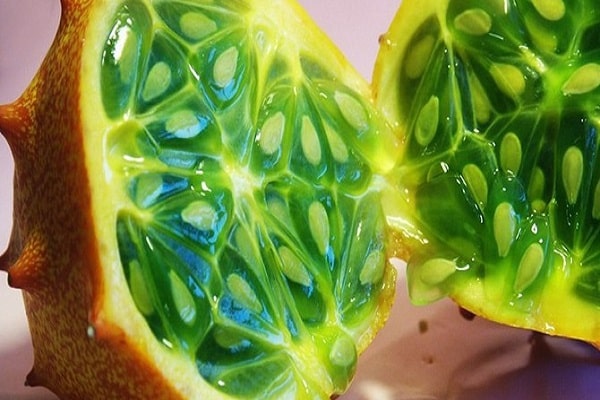
Also, it is eaten in salads, sprinkled with salt and pepper, and poured with lemon juice. An interesting taste appears in jams and cocktails when Kiwano is added.
In addition to eating it raw, Horned Melon can be salted and canned. For this, young fruits are used, which in a pickled state have a much richer taste than cucumbers. Gourmets speak of them as a delicacy. But of course, Kiwano has the maximum benefit and the best taste right after harvest.
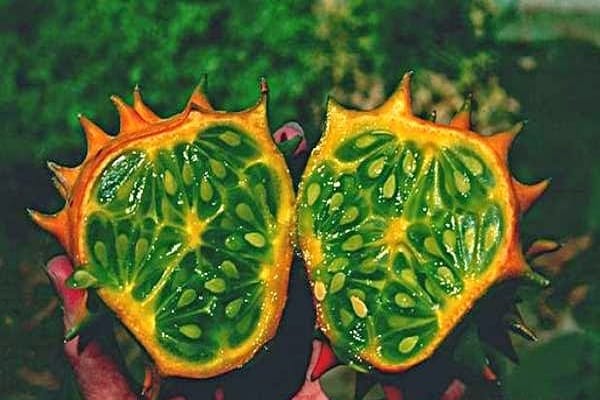
How to Grow Horned Melon from Seed?
Since many people like this fruit, the question arises about its cultivation. In order for a plant to grow from seeds, you need to do the work in several stages:
- Seed preparation. To do this, they are soaked in a growth stimulator. Seed material swells and this contributes to earlier emergence of seedlings.
- Drop into containers. They are filled with a nutrient substrate and seeds are sown. After sowing, watered. Leave for some time in a warm place.
- Choosing a place for the growth of seedlings. Although the sun is hot in Africa, direct rays can cause burns on the leaf plates. Therefore, only diffused sunlight is shown to seedlings.
- Landing in open ground. At the end of the last frost, the plants are planted in the soil. When transplanting, observe the distance between the rows of 50 centimeters.
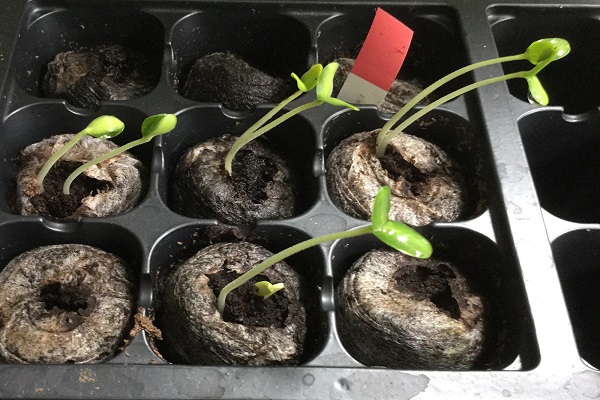
Particular attention is paid to the place where the culture will grow: it must be protected from both the winds and the scorching sun. When you do not adhere to this recommendation, then you can not wait for the fruit, because burns will occur on the leaves, and the ovaries will fall off.
Plant care
Caring for this exotic culture consists in the timely completion of certain operations. This is weeding and loosening, watering, feeding, pinching, tying, collecting Kiwano.
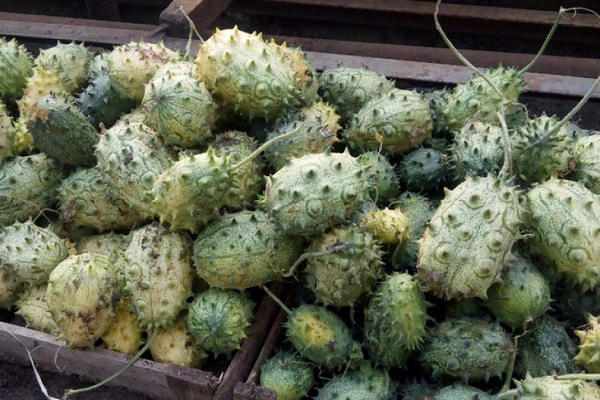
It is necessary to loosen and remove weeds as a crust appears on the soil surface and grass grows.
Water it up to 3 times a week, as this plant is moisture-loving. It also responds well to feeding. They are held regularly. To prepare the solution, use mullein, chicken droppings or other nitrogen-containing fertilizers. Such dressings alternate with mineral fertilizers - complex fertilizers are ideal for this. Foliar spraying also gives good results.
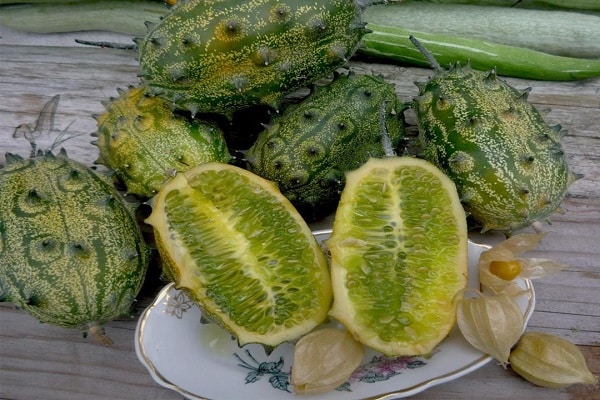
The next step is to pinch the lateral branches to the ovary, and the barren flowers are completely removed. Plants must be tied up, since these are vines. To do this, it is enough to make a wooden stand for them and fix the shoots of this culture to it.
The ovaries are removed in a day - two. The regularity of the harvest will encourage the plant to grow new fruit. When the fruiting season is over, it is advisable to put Kiwano in compost.
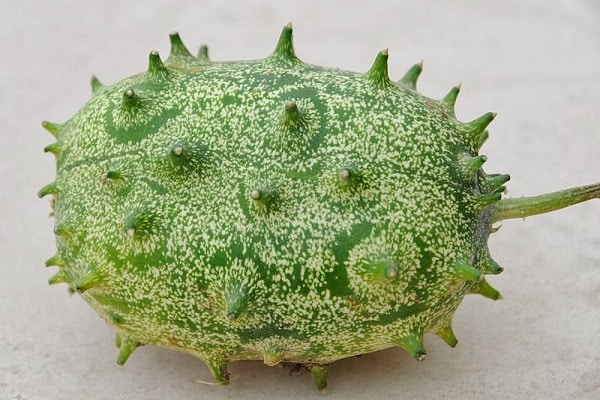
Anyone can grow Horned Melon today. With proper care, this plant can produce an excellent harvest. Kiwano will delight people with the decorativeness of its appearance and delicious fruits.Also, these fruits will not only make up for the deficiency of nutrients, but also improve human well-being in many diseases.
